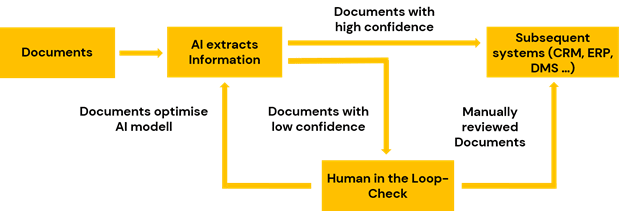Quality assurance in process automation

This article is an excerpt from the whitepaper Bridging the Gap - More productivity and lower costs through automation of knowledge-based processes. Read the full whitepaper here.
–
As soon as documents are digitised and intelligently evaluated, there are many possibilities to optimise the value chain. Previously unknown patterns and connections become visible, potentials are recognised, risks are avoided and knowledge about processes is extracted.
Situation, Challenge and Solution
Document analysis is a very large and diversified field with a multitude of use cases. The inherent complexity comes from three main sources:
- Different document types such as contracts, e-mails, letters, forms, notes, historical documents from company archives, but also transcriptions of audio files each have their own characteristics and are available in different formats.
- Relevant information is not phrased uniformly in documents. Effective document analysis must recognise information from different terms and depending on the context.
- Information has to be received along a wide range of processes, processed in a structured way and returned, so flexible integration with various systems is required.
Central results are collected in an archive that is continuously enriched with all digitised documents as well as intermediate results from the workflows. These findings are used to train AI models. The human-in-the-loop is essential here:

Patterns enable potential - unleash the potential
Patterns can be searched for and recognised in structured data. These regularly hold enormous potential for the optimisation of products, services and processes - which could not be raised manually in any commercially justifiable cost-benefit ratio. Intelligent document analysis, which connects inventory systems and evaluates unstructured data, makes it possible for the first time to raise this potential in a scalable way and to systematically realise the associated business successes.
Automate and optimise business processes
Processes can be accelerated through document analysis - shortened response times increase conversion and customer satisfaction in equal measure. Internally, processes are simplified, accelerated and continuously adapted to changing situations. Certain process steps are eliminated altogether, so that professionals individually and companies as a whole can concentrate more on their core competencies.
Identify unidentified business risks
In many documents and the processes associated with them, not only potentials but also risks lie dormant. Identifying these efficiently represents a major business advantage. With intelligent document analysis, companies can react in a targeted manner - and act proactively to prevent such risks.
Supporting professionals
Automated processes that perform intelligent document analyses relieve valuable employees who are otherwise tied up in monotonous routine processes. This relief frees up capacities for higher-value tasks. As a side effect, this also increases employee satisfaction.
Bottom line
As soon as documents are digitised and intelligently evaluated, there are many possibilities to optimise the value chain. Previously unknown patterns and connections become visible, potentials are recognised, risks are avoided and knowledge about processes is extracted.
The AI system for intelligent document processing
Completely integrated into your work process, the AI software kinisto can support employees - previously manual work steps on the document are automatically done by the AI. As a specialist for AI technology in practical use, we will be happy to advise you on the topic and on your specific case!
